|
|
|
Sort Order |
|
|
|
Items / Page
|
|
|
|
|
|
|
| Srl | Item |
| 1 |
ID:
138497
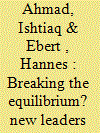

|
|
|
|
|
| Summary/Abstract |
The election of new governments in Pakistan and India in 2013 and 2014, respectively, has sparked controversies about the likely trajectory of the enduring rivalry. Emerging individual and domestic conditions reportedly created new opportunities for incremental rapprochement. Equipped with strong political mandates and backed by powerful constituencies, Pakistan's Nawaz Sharif and India's Narendra Modi initially set out to stabilize and revive their countries’ fragile economies and declared improved bilateral ties as a key precondition for implementing their economic agendas. However, mutual recriminations and border tensions resurfaced soon to prevent the revival of the stalled diplomatic dialogue in late 2014. Drawing on a thorough review of research on rivalry maintenance and termination and, in particular, the assumptions of the punctuated equilibrium model developed by Paul Diehl and Gary Goertz, this paper demonstrates how the conflict's structural complexities are likely to persist and undermine the chances for conflict resolution in the years ahead. The prevalent role of the army and a vibrant anti-Indian Islamic ideology in Pakistan, the persistence of a conflict lobby in India, lingering territorial feuds and ever increasing power asymmetries between the two countries, and decreasing third-party mediation in the Indo-Pakistani conflict will likely suffocate any initiative, however well-intended or pragmatic it may be. Even if bold leadership manages to revive a comprehensive peace process, it would have to be based on systematic confidence building measures in order to make it resilient to crises.
|
|
|
|
|
|
|
|
|
|
|
|
|
|
|
|
| 2 |
ID:
110845
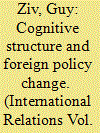

|
|
|
|
|
| Publication |
2011.
|
| Summary/Abstract |
Rationalist explanations of foreign policy change are underdetermined because they overlook the decision-makers themselves. Insight from cognitive psychology shows that individuals' cognitive structures provide a useful lens through which to understand why some people are more likely than others to change their core beliefs. Two related cognitive variables - cognitive openness and cognitive complexity - hold promise for enhancing extant explanations of foreign policy change. This article assesses the cognitive structure of the three leaders who dominated Israeli decision-making in the decade leading up to Israel's dramatic policy change vis-à-vis the PLO in 1993: Yitzhak Shamir, Yitzhak Rabin and Shimon Peres. The article demonstrates that Peres, who is found to be the most cognitively open and complex, was quicker to embrace a dialogue with the PLO than Rabin, while Shamir, who is found to hold the lowest levels of openness and complexity, rejected this move altogether. Peres, and to a lesser extent Rabin, proved to be more sensitive to international, regional and domestic changes than Shamir. This case illustrates that systemic-structural and domestic political factors are necessary, but insufficient, conditions for foreign policy change. The levels of decision-makers' cognitive openness and complexity are key to determining the likelihood that they will change their beliefs on a core policy issue that can, in turn, lead to foreign policy change. This article thus contributes to our understanding of both foreign policy change and the process leading up to the historic 1993 agreement between Israel and the PLO.
|
|
|
|
|
|
|
|
|
|
|
|
|
|
|
|
| 3 |
ID:
146209
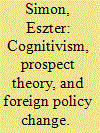

|
|
|
|
|
| Summary/Abstract |
This article investigates the cognitive limitations on policy change in counterinsurgency (COIN) efforts by examining why American decision-makers failed to revise their government strategy substantially while fighting the insurgency in Afghanistan in 2003–2014 and why their British counterparts were more successful in adjusting their policies in the Malayan insurgency in 1948–1954. Unlike most of the COIN literature that concentrates on military strategy and tactics, the analysis of government policy-making in Malaya holds some important political lessons for American leaders today despite differences between the insurgencies in Afghanistan and British Malaya. As a response to the criticism of COIN studies in general that they lack theoretical guidance, this article utilizes an integrated cognitivist-prospect theory framework. It is argued that some of the COIN literature mistakenly suggests that a more difficult strategic situation was primarily responsible for American failure in Afghanistan. Instead, American decision-makers faced a more difficult task cognitively than their British counterparts, as policy change in Afghanistan would have required greater ideational change. American principals were much more attached to their beliefs emotionally, had no alternative problem representation, and had to shift between frames in order to engineer a response that was more in line with events on the ground in Afghanistan. Regarding prospect theory, findings indicate that gains frames appear to be unhelpful in monitoring progress until catastrophic failure endangers the reference point, and that decision-makers often have more than one reference point to attune their policies to, which often results in suboptimal choices with regard to at least one reference point.
|
|
|
|
|
|
|
|
|
|
|
|
|
|
|
|
| 4 |
ID:
105959
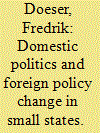

|
|
|
|
|
| Publication |
2011.
|
| Summary/Abstract |
The article sets out to further an understanding of how domestic politics can impact on foreign policy change in small states. The case of interest is the change that occurred in the foreign policy of Denmark when its government managed to put an end to the 'footnote policy' in mid-1988. The main conclusion is that changes in two particular domestic political factors, in terms of political party opposition and public opposition, facilitated a change in foreign policy for the Danish government. Changes in party and public opposition created opportunities for the government to use foreign policy change as a strategy to increase its political power on the domestic scene. In this case of foreign policy change, domestic political factors and external forces were equally important.
|
|
|
|
|
|
|
|
|
|
|
|
|
|
|
|
| 5 |
ID:
165299
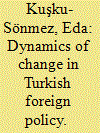

|
|
|
|
|
| Summary/Abstract |
This paper offers a contribution to the literature on Turkish foreign policy (TFP) change through quantitative analysis of Turkey’s foreign policy chronology under the ruling Justice and Development Party (Adalet ve Kalkınma Partisi, AKP) between January 2009 and October 2016. It utilizes an original dataset on foreign policy meetings which is then utilized to ascertain the alterations in their volume, direction and purpose. Through this analytical framework, the paper depicts the course of TFP orientations towards different countries and regions, as well as potential explanations of their dynamics. Among its many findings, the paper suggests that bilateral diplomatic activism in the late AKP period can be explained by motivating factors such as trade, geographical proximity and shared identity. Moreover, fluctuations in regional orientations of TFP can be associated with sudden and less calculated reactions to international or domestic political crisis situations.
|
|
|
|
|
|
|
|
|
|
|
|
|
|
|
|
| 6 |
ID:
187377
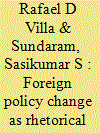

|
|
|
|
|
| Summary/Abstract |
Although the recent advancements in critical constructivist IR on political rhetoric has greatly improved our understanding of linguistic mechanisms of political action, we need a sharp understanding of how rhetoric explains foreign policy change. Here we conceptualize a link between rhetoric and foreign policy change by foregrounding distinct dynamics at the regional and domestic institutional environments. Analytically, at the regional level, we suggest examining whether norms of foreign policy engagement are explicitly coded in treaties and agreements or implicit in conventions and practices of actors. And at the domestic level, we suggest examining whether a particular foreign policy issue area is concurrent or contested among interlocutors. In this constellation, we clarify how four different rhetorical strategies underwrites foreign policy change – persuasion, mediation, explication and reconstruction – how it operates, and the processes through which it unfolds in relation to multiple audiences. Our principal argument is that grand foreign policy change requires continuous rhetorical deployments with varieties of politics to preserve and stabilize the boundaries in the ongoing fluid relations of states. We illustrate our argument with an analysis of Brazil’s South-South grand strategy under the Lula administration and contrast it against the rhetoric of subsequent administrations. Our study has implications for advancing critical foreign policy analysis on foreign policy change and generally for exploring new ways of studying foreign policies of nonwestern postcolonial states in international relations.
|
|
|
|
|
|
|
|
|
|
|
|
|
|
|
|
| 7 |
ID:
139529


|
|
|
|
|
| Summary/Abstract |
This study examines the effect of domestic political change on United Nations General Assembly (UNGA) voting. We argue that foreign policy change is most likely when a new leader—one who relies on different societal groups for support than her predecessor—comes to power. We then examine the extent that domestic institutional context—in particular, democracy—shapes this process. We test our hypotheses using a new measure of UNGA voting patterns and new data on changes in leaders' supporting coalitions. We find that change in the societal support base of leaders leads to change in UN voting, especially in nondemocracies. This study lends credence to the perspective that foreign policy, like domestic policy, can vary with the particular interests that leaders represent; it encourages scholars to focus less on leadership change per se and more on changes in the societal groups to which leaders are most accountable. This study also suggests that democratic institutions inspire policy consistency not only in areas governed by treaties and international law, but also in areas of foreign policy that are easier to alter in the short term.
|
|
|
|
|
|
|
|
|
|
|
|
|
|
|
|
| 8 |
ID:
148156
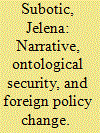

|
|
|
|
|
| Summary/Abstract |
While the recent IR “narrative turn” has greatly improved our understanding of how narratives influence state policy choices, we need to deepen our understanding of how narratives explain policy change. If state “autobiographies” provide such powerful explanations of why states do what they do, how can they change their policies and practices? To understand the relationship between policy change and state narrative continuity, I build on existing scholarship on narrative analysis and ontological security to examine ways in which state autobiographical narratives are used by political actors to confront state insecurities. My principal argument is that at times of great crises and threats to multiple state securities (physical, social, and ontological), narratives are selectively activated to provide a cognitive bridge between policy change that resolves the physical security challenge, while also preserving state ontological security through offering autobiographical continuity, a sense of routine, familiarity, and calm. I illustrate the argument with an analysis of Serbia's changing foreign policy behavior regarding the disputed status of Kosovo.
|
|
|
|
|
|
|
|
|
|
|
|
|
|
|
|
| 9 |
ID:
115029
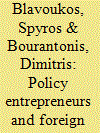

|
|
|
|
|
| Publication |
2012.
|
| Summary/Abstract |
Besides systemic changes that lead to the re-prioritization of foreign policy objectives, foreign policy change is also a result of domestic policy entrepreneurs' pursuit of a political return. Their potential to orchestrate change depends on the existing entry barriers that emanate from the political and institutional features of the domestic policy-making process. It is accentuated by system-wide developments and security crises that illustrate old policy failure. This article discusses the role of policy entrepreneurs in foreign policy change by reference to the Greek-Turkish rapprochement in the late 1990s that resulted in Turkey receiving the status of EU candidate country in 1999.
|
|
|
|
|
|
|
|
|
|
|
|
|
|
|
|
| 10 |
ID:
152973
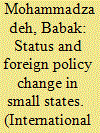

|
|
|
|
|
| Summary/Abstract |
Small states are just as easily seduced by status and glory as other states. When conceived as situated in a stratified international society, small states acquire an inherent tendency to overcome their disadvantage in conventional power terms through the pursuit of status. Hence, it is precisely because of their position in the international hierarchy, not in spite of it, that strategic ideas based on state size stimulate foreign policy change in small states. This mechanism provides an explanation to the question why the small state of Qatar has pursued such a high-profile diplomatic strategy since its emergence in the late 1990s.
|
|
|
|
|
|
|
|
|
|
|
|
|
|
|
|
|
|
|
|
|